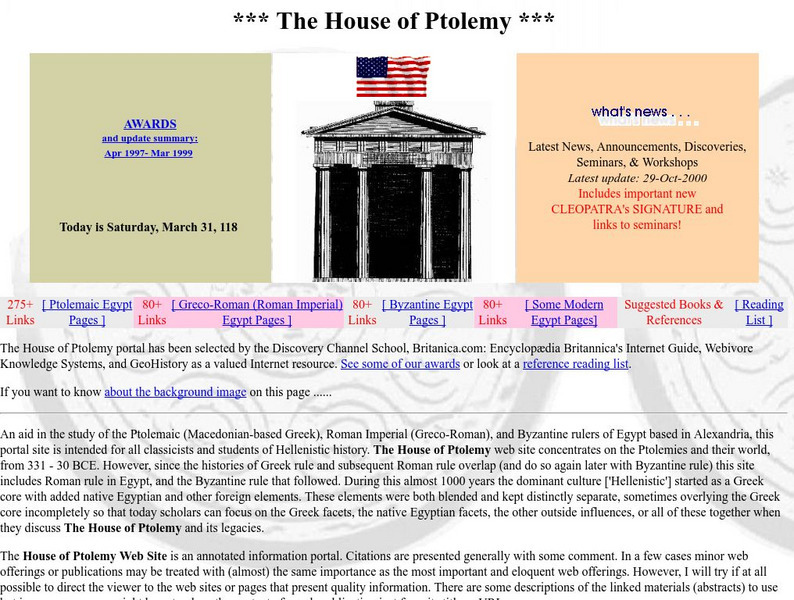Other
Focus Multi Media: History of Egypt
This site from FOCUS MultiMedia contains a concise history of Egypt from the time of the pharoahs through the Hellenistic Period. An interesting site to check out on the subject, and it contains a picture as well as a time line.
Other
The House of Ptolemy: Home Page
An extensive directory of Internet resources related to the Macedonian Dynasty in Egypt.
Other
New Geneva Center: Democritus
The New Geneva Center offers a brief description of the philosophy of Democritus and how he differed from Socrates.
Smart History
Smarthistory: Petra: The Rose Red City of the Nabataeans
Provides a short history of the ancient city of Petra in Jordan.
Stephen Byrne
History for Kids: Greek Daily Life
History for Kids presents an overview written for elementary students of daily life of the ancient Greeks. Students learn about Greek government, agriculture and industry, houses and food. Teacher resources included.
Mocomi & Anibrain Digital Technologies
Mocomi: Sir Dig a Lot: History Mysteries: Greek Architecture
Journey with Sir Dig-a-Lot and Rohan as they explore the ins and outs of Greek Architecture.
Other
Ancient greece.org: History of Greece: Periods Overview
A timeline of the ancient periods of Greek history.
Virginia Tech
Virginia Tech Digital Library: Historical Paradigms in Demosthenes' Speeches
An interesting article on the subjects the famous Greek orator Demosthese discussed in his public speeches. For example, Demosthenes talked about King Philip in many of his political speeches.
Ducksters
Ducksters: Quiz: Ancient Greece Timeline for Kids
History Questions: Ancient Greece Timeline Quiz, Test, and WebQuest
Tufts University
Perseus Digital Library: Ancient Olympic Events: Boxing
A description, with primary source illustrations, of how boxing was done in the ancient Greek Olympics.
Curated OER
Unesco: Bulgaria: Thracian Tomb of Kazanlak
Discovered in 1944, this tomb dates from the Hellenistic period, around the end of the 4th century BC. It is located near Seutopolis, the capital city of the Thracian king Seutes III, and is part of a large Thracian necropolis. The...
Curated OER
Click to View Full Sized Image
A picture of the Laocoon sculpture, one of the most famous of Hellenistic art.
Curated OER
Educational Technology Clearinghouse: Maps Etc: Plan of Olympia, 776 445 Bc
A plan of the ancient Greek sanctuary of Olympia, the site of the Olympic Games. Olympia is near the Peloponnese city of Elis. The plan shows the location of the stadium, gymnasium, temple, and other ancient features, including buildings...
Curated OER
Educational Technology Clearinghouse: Maps Etc: Hellas and Peloponnesus, 300 Bc
Map of Hellas and Peloponnesus in 300 BC, during the Hellenistic Period after the death of Alexander the Great.
Curated OER
Unesco: Bulgaria: Thracian Tomb of Sveshtari
Discovered in 1982 near the village of Sveshtari, this 3rd-century BC Thracian tomb reflects the fundamental structural principles of Thracian cult buildings. The tomb has a unique architectural decor, with polychrome half-human,...
Curated OER
Unesco: Turkmenistan: Parthian Fortresses of Nisa
The Parthian Fortresses of Nisa consist of two tells of Old and New Nisa, indicating the site of one of the earliest and most important cities of the Parthian Empire, a major power from the mid 3rd century BC to the 3rd century AD. They...
Curated OER
Unesco: Greece: Archaeological Site of Aigai (Modern Name Vergina)
The city of Aigai, the ancient first capital of the Kingdom of Macedonia, was discovered in the 19th century near Vergina, in northern Greece. The most important remains are the monumental palace, lavishly decorated with mosaics and...
Curated OER
Eternal Egypt: Headless Statuette of a Woman
The headless statuette of a woman reflects the start of blending the Egyptian and Hellenistic arts. The woman is standing in the traditional Egyptian style with her arms to her sides and her left foot striding forward.
Curated OER
Eternal Egypt: Hadara Container
A Hadara container dates from the Hellenistic period. It has a broad rim and a pear-shaped body. It is adorned with drawings of fish and flowers. The concave base is decorated with long harmonious lines colored white and orange.
Curated OER
Eternal Egypt: Black Small Plate
A pottery plate made of orange colored clay, it has a black glaze. This plate was one of the items used at the table during the Hellenistic era.
Curated OER
Eternal Egypt: Jug of Lagynos Style
A pottery lagynos, which is considered to be one of the containers that were sealed, such as jars, amphorae and oinochoi, which were used to preserve liquids and were all related to table service all through the Hellenistic period.
Curated OER
Eternal Egypt: Black Granite Statue of a Priest
A black granite statue of a priest with a shaven head that dates back to the Hellenistic period. The priest is carrying a canopic jar; his left cheek is resting against the jar. He is wearing a gown that covers his whole body and his hands.
Curated OER
Eternal Egypt: Roman Bust of Serapis
The Roman bust of Serapis is derived from a Hellenistic model. This bust is different from other depictions of Serapis as this style links him with the sun god Helios and the god of wine Dionysos.
Curated OER
Eternal Egypt: Pestle of Massive Stone
A cylindrical device made of massive stone, which dates back to the Hellenistic period. This pestle has rounded edges and was used with a mortar to grind corn or other hard food. Wheat and corn were ground in this way to make flour.
Other popular searches
- Hellenistic Culture
- Hellenistic Period
- Hellenistic Greece
- Hellenistic Era
- Hellenistic Age Greece
- Ancient Greece Hellenistic
- Hellenistic Art
- Hellenic vs Hellenistic
- Hellenic and Hellenistic
- Hellenic vs. Hellenistic
- Spread of Hellenistic Culture
- Hellenistic Ages







